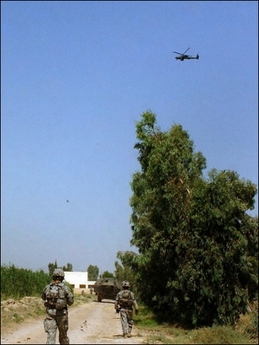Iraq al-Qaida group threatens Iran
(AP)Updated: 2007-07-09 13:46
CAIRO, Egypt - The leader of an al-Qaida umbrella group in Iraq threatened to wage war against Iran unless it stops supporting Shiites in Iraq within two months, according to an audiotape released Sunday.
 An Apache helicopter provides air support over US soldiers patrolling the outskirts of Baquba, north of Baghdad, 23 June. [Agencies]  |
"We are giving the Persians, and especially the rulers of Iran, a two month period to end all kinds of support for the Iraqi Shiite government and to stop direct and indirect intervention ... otherwise a severe war is waiting for you," he said in the 50-minute audiotape. The tape, which could not be independently verified, was posted on a Web site commonly used by insurgent groups.
Iraq's Shiite-led government is backed by the US but closely allied to Iran. The United States accuses Iran of arming and financing Shiite militias in Iraq - charges Tehran denies.
In the recording, al-Baghdadi also gave Sunnis and Arab countries doing business in Iran or with Iranians a two-month deadline to cease their ties.
"We advise and warn every Sunni businessman inside Iran or in Arab countries especially in the Gulf not to take partnership with any Shiite Iranian businessman - this is part of the two-month period," he said.
Al-Baghdadi said his group was responsible for two suicide truck bomb attacks in May in Iraq's northern Kurdish region. He said the attacks in Irbil and Makhmur showed the "Islamic jihad," or holy war, was progressing in the Kurdish areas.
At least 14 people were killed when a suicide truck bomb struck a government building in Irbil, Kurdistan's capital, on May 9. Four days later in Makhmur, another suicide truck bomb tore through the offices of a Kurdish political party, killing 50 people.
In the recording, the Islamic State of Iraq leader did not mention Saturday's deadly truck bomb in Armili, a Shiite town north of Baghdad, which killed more than 100 people. The attack was among the deadliest this year in Iraq and reinforced suspicions that al-Qaida extremists were moving north to less protected regions beyond the US security crackdown in Baghdad.
Al-Baghdadi criticized Kurdish leaders for their alliance with Shiites in Iraq's government and accused them encouraging unsavory morals.
|
|
|
||
|
||
|
|